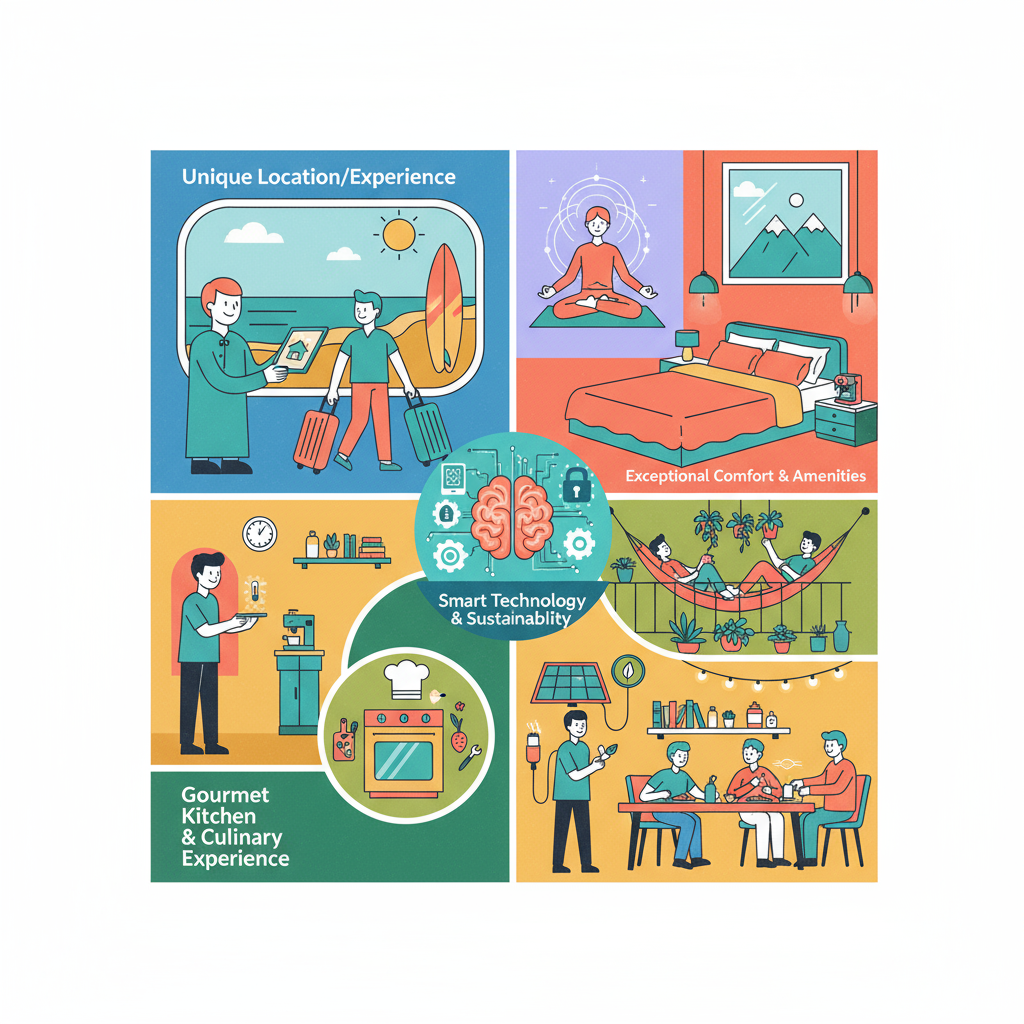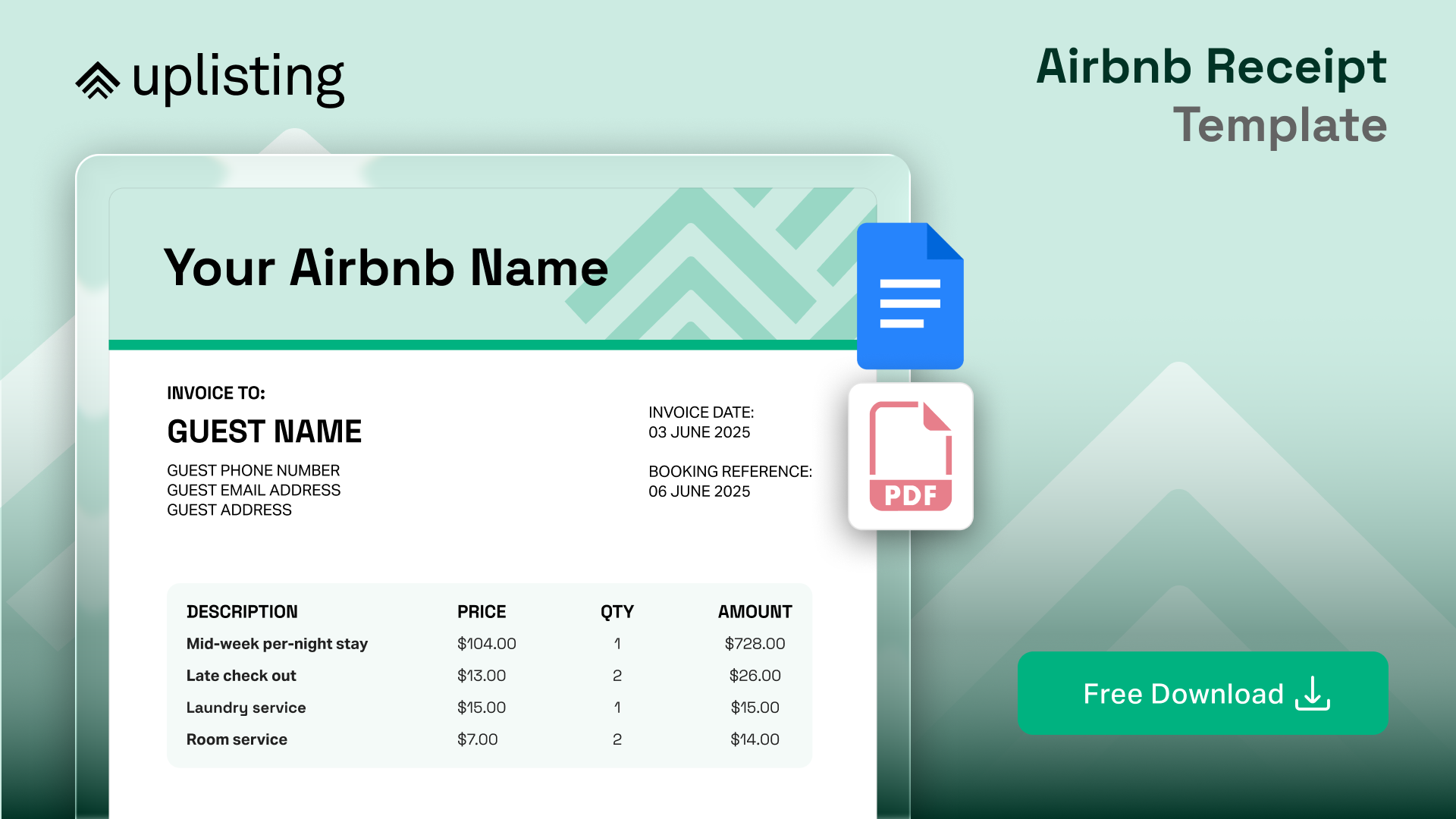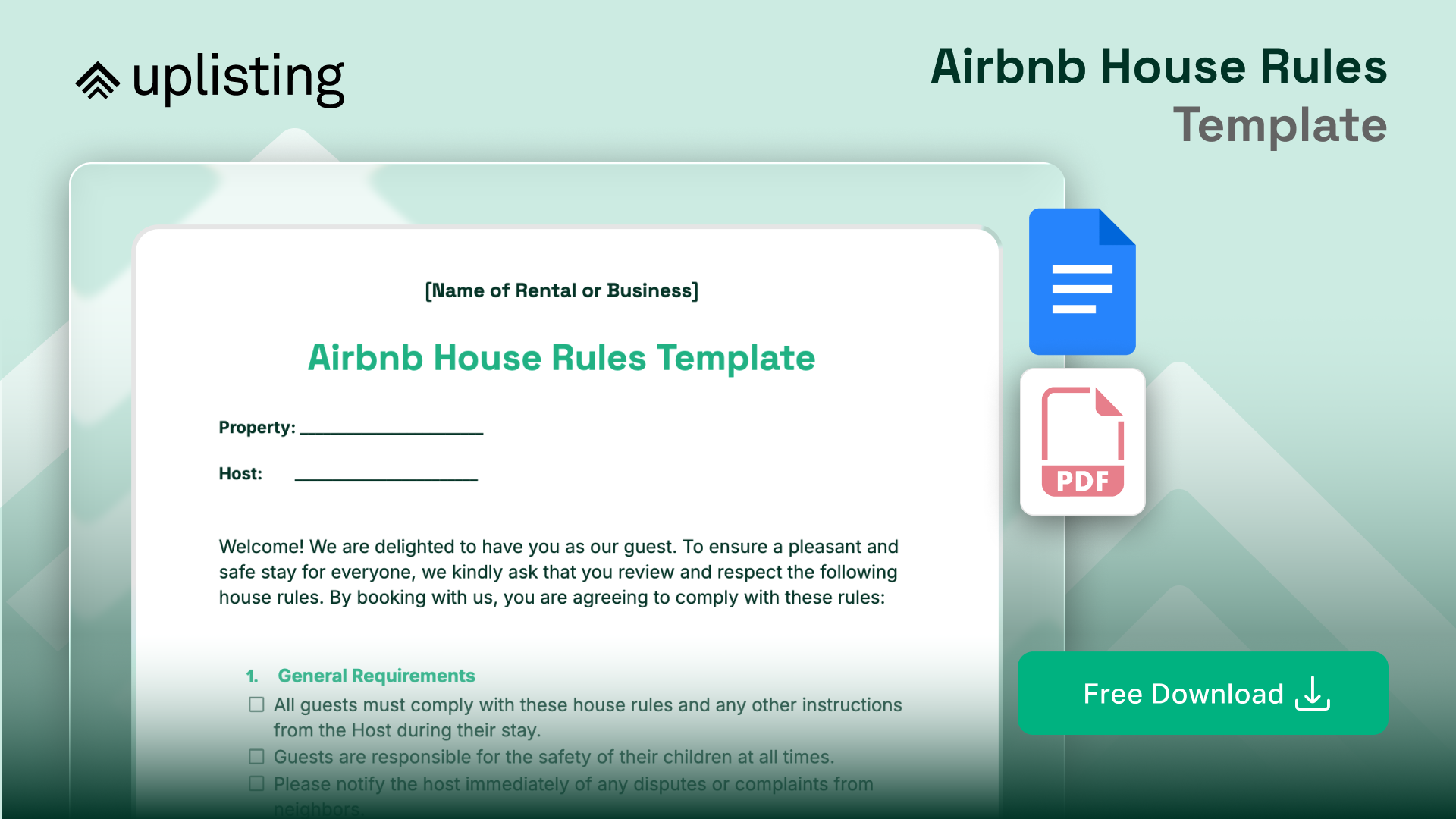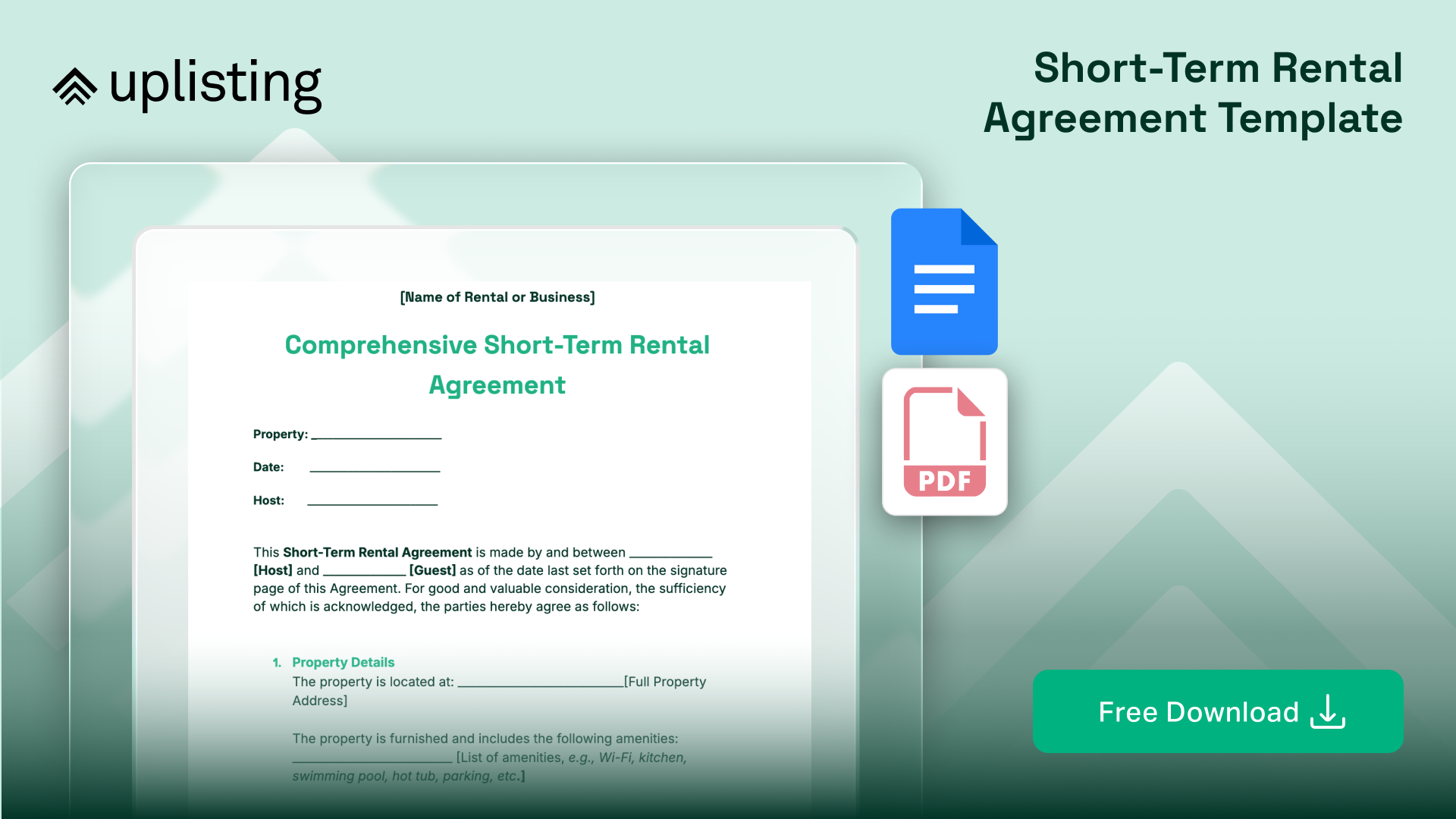Key Takeaways
Optimizing your Airbnb profit requires attention to pricing strategy, operational efficiency, and understanding local market dynamics
Successful hosts focus on quality over quantity—targeting the right guests with tailored amenities and consistent experiences
Using data-driven tools and automation systems helps reduce costs and maximize your Airbnb profit margin
Airbnb entered 2025 with strong momentum. The platform posted $3.7 billion in revenue in Q3 2024 alone, with free cash flow exceeding $4 billion and adjusted EBITDA margins climbing to 52%. These performance gains reflect a deliberate strategy to increase the quality of listings on the platform, improve guest satisfaction, and streamline operations.
For short-term rental hosts, these numbers matter. Airbnb’s profitability directly impacts the visibility, pricing potential, and long-term demand for listings on the platform. With a stable and growing ecosystem, hosts are better positioned to build consistent revenue streams that scale over time.
When Airbnb thrives financially, it's a strong signal you're using the right platform for your business. Their continued profitability means they'll keep investing in features that benefit their most crucial stakeholders—hosts like you.
Remember that while Airbnb's corporate success creates the ecosystem, your individual profit depends on strategic decisions at the property level. In the following sections, we'll explore exactly how small operators can leverage these platform advantages, implement targeted income-generating strategies, and transform part-time listings into sustainable businesses that consistently deliver strong returns regardless of broader market conditions.
Factors Affecting Airbnb Profit
While Airbnb's financial health provides the backdrop for host opportunities, your individual profit comes down to dozens of small decisions rather than any single factor. While the platform thrives on a macro level, your success depends on the micro details—pricing strategies, seasonal timing, property condition, and operational efficiency. Even with strong platform demand and a full booking calendar, your profit margins can quietly erode if small problems accumulate unnoticed.
Location remains the foundation of your earning potential. However, being in a high-demand area doesn't automatically guarantee strong returns if your listing is outshined by better competitors or hampered by restrictive local regulations. A downtown Austin loft with no parking and outdated photos simply won't perform like a well-equipped condo just four blocks away with professional photography. Local ordinances can further complicate matters by limiting rental frequency, imposing additional taxes, or even prohibiting short-term stays entirely. Getting blindsided by these regulations often costs more than several missed bookings combined.
Your immediate competition shapes guest expectations in ways that directly impact your bookings. When nearby properties offer superior lighting, faster Wi-Fi, or more streamlined check-in processes, your calendar may remain stubbornly empty unless you make appropriate adjustments. Regularly monitoring your closest competitors helps identify critical gaps in your offering. It could be the difference of a missing must-have amenity, a poorly selected featured photo, or simply a rate that doesn't align with the actual value you provide.
Smart pricing choices
Pricing needs constant attention. Set it too high, and guests scroll past. Set it too low, and you’re fully booked but barely covering costs. Automated pricing tools help by adjusting based on local demand, booking windows, and events, but they’re not perfect. Owners still need to make the final call.
Rates should match the experience. If you’re charging close to the top of your market, the listing needs to deliver: clean, consistent, and convenient. If you’re still working out the kinks, it’s smarter to sit just under the top players and use great service to build up your reviews. Guests aren't always looking for the cheapest place—they’re looking for the most value for their money.
Occupancy and seasonality
Occupancy shifts with the calendar. In beach towns, summer is packed. In mountain towns, winter weekends are gold. But when peak season ends, bookings slow and gaps show up fast. The properties that stay profitable year-round usually shift their approach during slow periods. Some target digital nomads with discounts for longer stays. Others adjust minimum night rules or switch to mid-term rentals to keep the lights on.
Guest types also change depending on the week. Midweek stays often come from business travelers, while weekends pull in couples or small groups. During holidays, families take over. Tailoring the listing to match each group—both in photos and amenities—helps fill the calendar when demand is unpredictable.
Cost management tactics
Revenue feels good, but expenses can quietly erase it. Cleaning fees, restocking supplies, and monthly bills all add up fast. Hosts who stay profitable usually standardize what they buy, keep an eye on recurring charges, and run tight systems for cleaning and maintenance.
Start with the big stuff. A leaky faucet or broken AC unit can ruin a stay and tank your reviews, not to mention the repair bill. It’s cheaper to fix problems early than to refund a bad experience. Then check the small stuff: how much you're spending on laundry, Amazon orders, or subscription services. If something doesn’t directly improve the guest experience, it might not belong on the monthly statement.
Tracking expenses every month gives a clearer picture of what’s really left after a guest checks out. The calendar might look full, but the numbers tell the real story.
All-in-one Vacation Rental Software and Channel Management System
Get started in seconds by connecting Airbnb
Manage short-term rentals & bookings, message guests, take payment, and so much more. All in one easy-to-use platform (that never double-books).
Future Outlook for 2025
Short-term rentals are shifting fast, and 2025 is already rewarding hosts who stay flexible, think beyond borders, and pay attention to what travelers actually want. The strongest opportunities are going to operators who adapt faster than larger, slower-moving competitors.
International bookings are growing, especially in places where listings are still catching up with demand. According to Airbnb, cities in Brazil, South Korea, and across mid-sized European countries are seeing more activity as travelers look for alternatives outside major metros. Operators running tight, streamlined setups can move faster, test new locations, or work with local co-hosts to tap into these travel patterns without adding overhead.
Booking lead times are dramatically shifting. According to recent AirDNA data, 38% of all short-term rental reservations are made within 14 days of check-in and the average booking window has shortened. Last-minute bookings (within 5 days of arrival) now account for nearly 20% of all reservations, while long-range planning (more than 6 months out) has declined to only 6% of bookings.
Comparing reservations made in May 2024 to those in May 2025, bookings made with a day of arrival increased by nearly 4%, while bookings made 2 to 3 months in advance fell by 4%. Hosts who've optimized their pricing and availability for these shorter windows are capturing revenue that others miss. This trend requires more responsive management and dynamic pricing strategies that can adjust quickly to fill calendar gaps.
Remote work isn't fading. More travelers are booking longer stays in secondary cities where life is cheaper, Wi-Fi is strong, and there's room to spread out. Hosts offering weekly or monthly discounts, reliable internet, and a comfortable desk setup are already seeing longer bookings with lower turnover and fewer gaps on the calendar. The growth in small city and rural markets continues to outpace major cities, with the supply of listings in places like Boise, Asheville, and Chattanooga growing by nearly 14% year-over-year.
Shorter attention spans and smaller screens are shaping booking behavior. Over half of all reservations now happen through the Airbnb app. That means your listing needs to load quickly, look sharp on a phone, and make booking feel effortless. High-resolution photos, clear amenities, and simple pricing are the reason guests stop scrolling and hit "Book."
Local laws are tightening. More cities are adding zoning rules, registration steps, and tax requirements. Urban centers and coastal regions are especially active here. Hosts who stay on top of new rules and build compliance into their operations will keep listing long after others get delisted or fined. Skipping the paperwork might save time now, but it usually costs more later.
Shifts in guest expectations
Travelers want more than a cheap place to sleep. They’re booking homes that feel part of the neighborhood, not just near it. A space with local character and thoughtful touches—art from nearby markets, neighborhood guides, coffee beans from the shop down the street—feels personal in a way that generic setups don’t.
Guests also expect more flexibility. Flexible cancellation policies often drive better booking rates, especially for longer trips or international stays. Some operators hesitate here, but strict cancellation rules can push travelers toward listings that feel safer to book. Offering a little give-and-take tends to pay off.
Emerging market opportunities
Certain regions are heating up, especially for operators who can move quickly and keep costs low. Brazil is seeing more domestic travel, with growth in beach towns and growing demand in urban centers. Mid-sized cities across Central and Eastern Europe—like Kraków, Porto, and Budapest—are pulling in digital nomads and budget-conscious travelers.
Brazil: More locals are traveling within the country, and listings haven’t caught up yet. Hosts who get in early, especially in coastal cities, have a chance to stand out before the market fills up.
Mid-sized European cities: Travelers are moving away from expensive capitals and into more affordable, culturally rich cities. Lower competition and operating costs make these locations a smart test ground for new listings.
Asia-Pacific: Korea and other Southeast Asian countries are rolling out tourism campaigns and travel incentives, which are drawing more bookings in cities that historically had fewer STR listings.
Operators who explore beyond their home markets—or partner with others who already have local knowledge—can spread risk and build steady income across different regions. Airbnb profit in 2025 isn’t just about location anymore. It’s about how quickly you can adjust to where demand is going next.

Strategies to Sustain Profit
Short-term wins feel great until the calendar dries up. Building reliable income in 2025 requires foresight that extends past next week’s check-in and focuses on what actually keeps the business running: consistent systems, better listings, and a brand guests remember. The goal is quality over quantity: not just more bookings, but better ones.
Airbnb profit comes from solid performance, not guesswork. Pull the plug on listings that eat time and barely break even. Focus energy on properties that attract strong reviews, book regularly, and don’t create daily headaches.
Relying on just one booking site adds risk. Any change—fees, search ranking, cancellation policy—can hit your bottom line without warning. Adding multiple channels and building a direct booking strategy gives you more control and a healthier revenue mix.
Optimize listings for quality guests
The right guest starts with the right setup. A business traveler doesn’t need bunk beds. A family with toddlers doesn’t want glass tables or sharp corners. Tailor amenities to match who you want to host. Think travel cribs, blackout curtains, fast Wi-Fi, or a proper desk.
What’s outside the property matters too. Guests want to know what sets your place apart. Mention the coffee shop next door, the hiking trail five minutes away, or the stadium within walking distance. If your short-term rental sits near a hospital, convention center, or festival venue, say so. That context adds value and helps the listing stand out.
Automate operations for efficiency
Repetitive work slows everything down. Late-night message replies, forgotten cleaning schedules, and double bookings are stressful events that cost you money. Automation cuts out the chaos and gives guests a smoother experience.
A property management system like Uplisting pulls calendars into one place, syncs availability across platforms, and helps prevent booking conflicts. Automating guest communication also means no more missed check-in instructions or rushed review requests. Everything runs on time, every time.
The less time you spend on repetitive tasks, the more time you have to actually grow the business.
Strengthen brand identity
Forgettable listings fade into the background. A strong brand gives guests something to connect with. That could be a consistent color palette, a local design theme, or a standout welcome ritual—anything that makes the stay feel intentional.
Consistency builds trust. Whether you manage one property or five, use a shared tone, visual style, and guest experience to tie everything together. Guests might not remember the listing name, but they'll remember the handwritten welcome card, the curated local playlist, or the snack basket featuring nearby favorites.
Those small moments lead to better reviews, more direct inquiries, and repeat guests who already know what to expect.
Create 5-star guest experiences
Give your guests unforgettable experiences
With Uplisting, you can send the right messages at the right time on all booking sites. Read and respond to guest messages in a single, unified inbox — whether you’re at the office or on the go.
Tools and Resources
Profit doesn’t come from guesswork. It comes from precision. The sharper the tools, the easier it is to stay focused, spot what’s working, and fix what isn’t. For short-term rental operators, the goal isn’t to add more complexity. It’s to cut through distractions and focus on what moves the needle.
Rental calculators with real-time market data help you price your property based on demand, not assumptions. Tools like AirDNA give you visibility into average daily rate (ADR), occupancy, and how nearby listings perform. That kind of insight makes pricing a strategic move instead of a wild guess. It also helps catch underperformers before they quietly drain your Airbnb profit.
Comprehensive property management tools
Trying to manage multiple listings with spreadsheets and scattered calendars is a quick way to burn out. Property management software (PMS) keeps everything in one place—bookings, guest communication, cleaning schedules, and financial tracking. Instead of juggling five apps, you just open one.
The right PMS removes repetitive tasks, prevents double bookings, and gives you more time to focus on growth. Whether you're responding to a booking inquiry or reviewing revenue, you stay in control without needing to be glued to your phone.
Local partnerships and co-hosting networks
Scaling doesn’t mean doing more alone. Local cleaners, maintenance pros, and co-hosts help you stay consistent, especially when you’re stretched thin or managing from a distance. Reliable partners keep your property guest-ready and take pressure off your daily routine.
Many operators working in unfamiliar markets also lean on co-hosting networks. These experienced hosts handle day-to-day tasks like guest messaging, check-ins, and turnover in exchange for a percentage of the revenue. It’s a good way to test a new area without committing to full-time oversight.
Planning for scaling
Growth gets messy without a clear plan. Adding more listings without reviewing performance benchmarks just creates noise. Checking your numbers monthly—like income per listing, review scores, and average response time—helps you spot problems early.
When messages start slipping through the cracks, it’s time to bring on a virtual assistant. If weekends are spent resetting beds and taking out trash, hire a cleaning team. Waiting until things fall apart just makes recovery harder. The most efficient operators hire ahead of the mess.
Monitoring performance metrics
Tracking numbers consistently gives you control over where the business is going. Each listing needs regular check-ins on three core metrics:
Occupancy rate: Shows how often your property gets booked. Low rates usually point to pricing issues, poor visibility, or seasonal slowdowns.
Average daily rate (ADR): Measures how much guests pay per night. High rates only help when they don’t scare off bookings.
Net operating income (NOI): Tells you what’s left after covering expenses. If your calendar’s full and profit’s still low, this number explains why.
Dashboards with real-time updates help you adjust before the month ends. You don't need to wait for a bank statement to spot a problem. When pricing dips or reviews shift, you can react in real time, before it starts costing you. Uplisting's reporting tools give you instant visibility into key metrics like revenue forecasts, occupancy trends, and channel performance, all from a single dashboard. Our customizable reports let you drill down by property, date range, or booking source so you can quickly identify which listings are driving profit and which need attention. Having these insights at your fingertips means you can make data-driven decisions that protect your margins without spending hours compiling spreadsheets.
Looking ahead, sustained profit will come from well-managed listings, strong guest experiences, and smart use of tools that reduce manual work. With the right systems in place, property managers can scale confidently, respond to guest needs faster, and stay competitive in a rapidly evolving market.
Sign up for Uplisting to streamline your vacation rental management. Our platform helps you automate operations, centralize guest communication, and optimize earnings across every property you manage.
FAQs About Airbnb Profit
How to determine if Airbnb is profitable?
Profit comes down to what stays in your pocket after everything else goes out. Start with your total income from bookings, subtract your operating costs—cleaning, supplies, maintenance, utilities, taxes, and platform fees—and what’s left is your net operating income. Break it out by property so you're not guessing where strong performance is coming from or where you're losing money.
What is a good profit margin for an Airbnb?
A solid margin usually falls between 20% and 40%. Hitting that range depends on your nightly rates, how often your place is booked, and how efficiently you’re running things behind the scenes. Margins under 15% usually signal something’s off—maybe rates are too low, expenses are piling up, or occupancy is inconsistent. Strong margins come from steady bookings and clean, repeatable operations, not just high nightly rates.
How much profit do Airbnb hosts typically make?
Most single-property hosts in steady markets earn between $500 and $2,000 a month after expenses. That range shifts depending on how well the property performs, how lean the operations are, and whether demand is steady year-round or tied to a peak season. Hosts with multiple properties and solid systems usually pull in more, but only when each listing runs smoothly and earns consistent reviews. High revenue doesn’t always mean high profit. Efficiency matters more than scale.


















.png)

